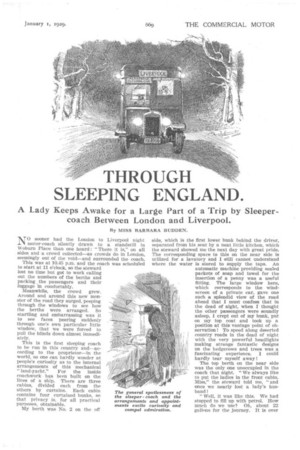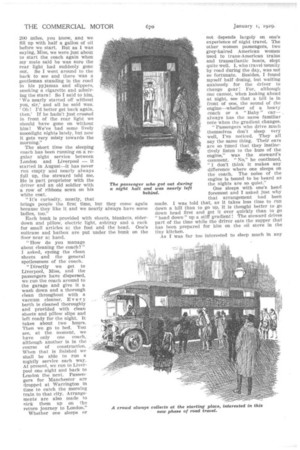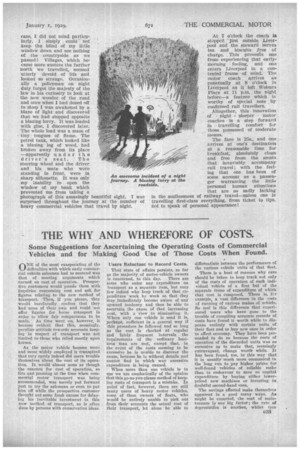SLEEPING ENGLAND.
Page 31

Page 32

Page 33

If you've noticed an error in this article please click here to report it so we can fix it.
A Lady Keeps Awake for a Large Part of a Trip by Sleepercoach Between London and Liverpool.
By MISS BARBARA BIDDEN.
NO sooner had the London to Liverpool night motor-coach silently drawn to a standstill in Woburn Place than one heard : "There it is," on all sides and a crowd collected—as crowds do in London, seemingly out of the void—and surrounded the coach.
This was at 10.45 p.m. and the coach was scheduled lo start at 11 o'clock, so the steward lost no time but got to work calling out the numbers of the berths and packing the passengers and their luggage in comfortably.
Meanwhile, the crowd grew. Around and around this new monster of the road they surged, peeping through the windows to see how the berths were arranged. So startling and embarrassing was it to see faces peering suddenly through one's own particular little window, that we were forced to pull the blinds down almost immediately.
This is the first sleeping coach to be run in this country and—according to the proprietor—in the world, so one can hardly wonder at people's curiosity as to the internal arrangements of this mechanical "land-yacht." For the inside coachwork has been built on the lines of a ship. There are three cabins, divided each from the others by curtains. Each cabin contains four curtained bunks, so that privacy is, for all practical purposes, obtainable.
My berth was No. 2 on the off
side, which is the first lower bunk behind the driver, separated from his seat by a neat little kitchen, which the steward showed me the next day with great pride. The corresponding space to this on the near side is utilized for a lavatory and I still cannot understand where the water is stored to supply the taps. An automatic machine providing sealed packets of soap and towel for the insertion of a penny was a useful fitting. The large window here, which corresponds to the windscreen of a private car, gave one such a splendid view of the road ahead that I must confess that in the dead of night, when I thought the other passengers were soundly asleep, I crept out of my bunk, put on my top coat and took up a position at this vantage point of observation! To speed along deserted country roads in the dead of night with the very powerful headlights making strange fantastic designs on the hedgerows and trees was a fascinating experience. I could hardly tear myself away!
The top berth on the near side was the only one unoccupied In the coach that night. "We always like to put the ladies in the front cabin, Miss," the steward told me, "and once we nearly lost a lady's husband!
"Well, it was like this. We had stopped to fill up with petrol. How much do we use? Oh, about 22 gallons for the journey. It is over
200 miles, you know, and we fill up with half a gallon of oil before we start. But as I was saying, Miss, we were just about to start the coach again when my mate said he was sure the rear light had suddenly gone out. So I went around to the back to see and there was a gentleman standing in the road in his pyjamas and slippers, smoking a cigarette and admiring the stars! So I said to him, We nearly started off without you, sir,' and all he said was, Oh! I'd better get back again. then.' If he hadn't just crossed in front of the rear light we should have gone on without him! We've had some lively moonlight nights lately, hut now it gets very misty towards the morning."
The short time the sleeping coach has been running on a regular night service between London and Liverpool — it started in August—it has never run empty and nearly always full up, the steward told me. He is part proprietor with the driver and an old soldier with a row of ribbons sewn on his white coat.
"It's curiosity, mostly, that brings people the first time, but they come again because they like it and we nearly always have some ladies, too."
Each bunk is provided with sheets, blankets, eiderdown and pillow, electric light, ashtray and a rack for small articles at the foot and the head. One's suitcase and hatbox are put under the hunk on the floor near at hand.
"how do you manage about cleaning the coach?" I asked, eyeing the clean sheets and the general spotlessness of the coach.
"Directly we get to Liverpool, Miss, and the passengers have dispersed, we run the coach around to the garage and give it a wash down and a thorough clean throughout with a vacuum cleaner. E v ery berth is cleaned thoroughly and provided with clean sheets and pillow slips and left ready for the night. It takes about two hours. Then we go to bed. You see, at the moment, we have only one coach, although another is in the course of construction. When that is finished we shall be able to run a nightly service each way. At present, we run to Liverpool one night and hack to Loudon the next. Passengers for Manchester are dropped at Warrington in time to catch the morning train to that city. Arrangements are also made to nick them up on the return journey to London."
Whether one sleeps or not depends largely on one's experience of night travel. The other women passengers, two grey-haired American women used to trans-American trains and transatlantic boats, slept quite well. I, who travel usually by road during the day, was not so fortunate. Besides, I found myself half dozing, but waiting anxiously for the driver to change gear For, although one cannot, when looking ahead at night, see that a bill is in front of one, the sound of the engine—whether of a heavy coach or a " Baby " car— always has the same familiar note when the gradient changes.
"Passengers who drive much themselves don't sleep very well, I've noticed. They all say the same thing. Their ears are so tuned that they instinctively listen to the hum of the engine," was the steward's comment. "No," he continued, "1 don't think it makes any difference where one sleeps on the coach. The noise of the engine is bound to be heard as the nights are so quiet."
One sleeps with one's head foremost and I asked just why that arrangement had been made. I was told that, as it takes less time to run down a hill than to go up, It is thought better to go down head first and get it over quickly than to go "head down" up a stiff gradient ! The steward drives part of the time while the driver eats the supper that has been prepared for him on the oil stove in the tiny kitchen. As T was far too interested to sleep much in any case, I did not mind particularly. I simply could". not keep the blind of my little window down and see nothing • of the countryside as we passed! Villages, which became more austere the farther north we travelled, seemed utterly devoid of life and looked so strange. Occasionally a policeman on night duty forgot the majesty of the law in his curiosity to look at the new wonder of the road . and once when I had dozed off to sleep I was awakened by a blaze of light and discovered that we had stopped opposite a blazing lorry. It was loaded with glue, I discovered later. The whole load was a mass of tiny tongues of flame. The petrol tank, which looked like a blazing log of wood, had broken away from its place —apparently under the driver's seat. The steering wheel and the driver and his mate who were standing in front, were in sharp silhouette. It was only my inability to open the window of my bunk which prevented me from taking a photograph of this amazingly beautiful sight. I was surprised throughout the journey at the number of heavy commercial vehicles that travel by night. At 7 o'clock the coach is stepped. -just outside LiverPool and the steward Serves tea and biscuits 1 free of charge. , This . prevenis one from experiencing that earlymorning feeling, and one enters Liverpool in a contented frame of mind. The motor coach arrives as punctually at 8 o'clock in Liverpool as it left Woburn Place at 31 p.m. • the night
• before—a feature which is worthy of special note . by confirmed rail travellers. Altogether, this innovation of night sleeper motor coaches is a step forward in travelling comfort for those • possessed of moderate means. •
The fare is 25s., and one arrives at one's destination at a reasonable time for treakfast, absolutely clean and free from the smuts that invariably accompany rail travel; with the feeling that one has been of some account as a passenger warranting the little personal human attentions that are BO sadly lacking in the soullessness of railway travel—unless one is travelling first-class everything, from ticket to tips, not to speak of personal appearance!
















































